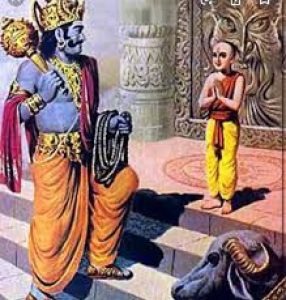mANDUkya Upanishad’ mantra 7 tells us that anything that is sensed, perceived, experienced or even thought about or conceptualized is not brahman. Consequently, Sages admit that “Advaita philosophy is incommunicable” (7, mANDUkya); “We do not know how to teach Advaita,” (1.3, kena). But at the same time, the Upanishadkars exhort us that “You should know It.”
Shankara too urges us in the Gita bhAShya (Ch 6, 9, 15.3, BGB;) and also at kaTha bhAShya that we should make every effort to attain the Knowledge of the Self in this life itself because “here alone it is possible to have a vision of the Self as clearly as (seeing) the face in a mirror, whereas this is not possible in other worlds apart from that of brahmA, which, however, is difficult to attain” (2.6.4, kaTha UB).
Hence, the teaching of Advaita philosophy is done adopting an apophatic approach, via negativa. It is the famous “na ( = not) (stated) iti ( = thus); not (stated) thus; na ( = not) (stated) iti ( = thus),” or neti; neti (2.3.6, BU); thus denying anything said about the Self is NOT It! Continue reading

 On the insistent questioning of the highly determined Naciketas, Lord Yama had no alternative but to reveal the secret code to ending the transient mortal world and realizing the “immortality” that one actually and already is. It is not some thing new that one acquires. It is prAptasya prAptiH (
On the insistent questioning of the highly determined Naciketas, Lord Yama had no alternative but to reveal the secret code to ending the transient mortal world and realizing the “immortality” that one actually and already is. It is not some thing new that one acquires. It is prAptasya prAptiH (